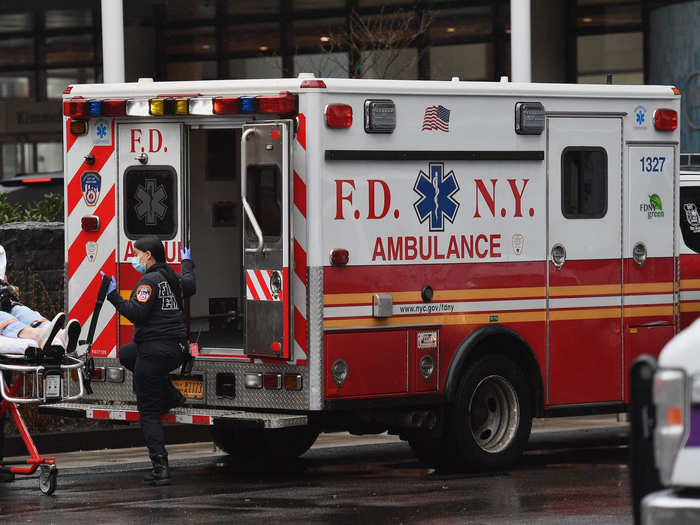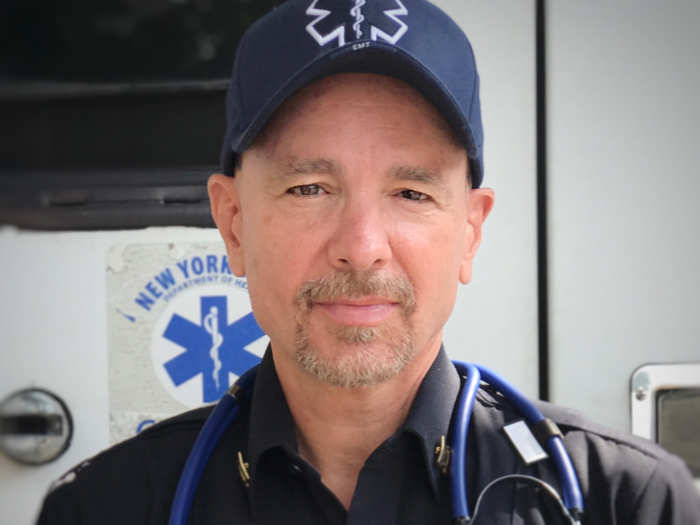- Home
- slideshows
- miscellaneous
- Inside the life of a volunteer EMT first responder in NYC, who decontaminates himself after every shift and has to pay for his own equipment: 'I still see people who won't take this seriously.'
Inside the life of a volunteer EMT first responder in NYC, who decontaminates himself after every shift and has to pay for his own equipment: 'I still see people who won't take this seriously.'
What a typical night is like: Cardiac arrests are the hardest calls

What it's like at NYC hospitals

The emergency rooms are over capacity. I have seen several ERs where almost every bed had an intubated patient. They are stuck in the ER waiting for space to open up in the hospital. I often wait an hour to get a patient seen by an admitting nurse. This means even more downtime for my crew and for every ambulance crew that brings in a patient.
While we wait around, we compare notes and stories with the other ambulance crews. We're all seeing and experiencing the same. There are many more cardiac arrests than ever before. One EMT shared a video with us from Facebook. It showed bodies fork-lifted into a refrigerated truck behind a Brooklyn hospital. This means the morgues are overflowing. It's been building up for weeks.
Even so, hospital crowding is a problem. The state government converted a massive convention center in Manhattan into a hospital. They are taking some of the overflow and can handle more than 2,000 patients.
Emergency calls have more than doubledSince around March 25, I started to see an increase in radio calls for sick patients. By the end of March, the call volume had doubled. We went from an average 3,500 calls a day to 7,000 now. What might be keeping that number from going any higher is people's fear of going to the hospital. Patients have become too scared to go.
But the increase in volunteers is making a difference. The other night I was able to take a low priority radio call in the Bronx for a man with abdominal pain. When we arrived, I found him doubled over in pain, sweating, and pale. He had thrown up seven times. When I examined him, he had rigidity in the middle abdomen. I had to rule out an aortic aneurysm, peritonitis, or even a heart attack. That meant a trip to the ER. That night the wait at the hospital was not long. More likely than not, I saved his life.
After a night of work, Atma cleans all his gear outside his home

When I finally get home at the end of the night, I have a very detailed process for decontamination to protect my loved ones. It starts in the hallway, where I remove all my equipment and boots. I decontaminate everything with bleach and alcohol wipes. I spray my work jacket with 100% alcohol. I remove my uniform, and I put it immediately in the washing machine.
I pay attention to every possible contamination, and I keep everything clean and sanitized. I use a bleach-based cleaner to disinfect boots and equipment. And I use 75% alcohol for my hands and clothing. One crucial trick I use is to imagine that I am a symptom-free carrier of the virus. Then, I behave according to that imaginary scenario. That way, I always think, "How do I prevent others from getting what I have?" As a result, my behaviors become very conscientious. For example, I always remember to wear a mask if I will be in proximity to anyone.
He makes sure people are social distancing on the streets, whether he's working or notI keep hoping New Yorkers will listen to the request of the health officials. But despite this and all the news and the shelter-in-place orders, I still see people who won't take this seriously. The other day I was walking through the East Village. I saw a group of about eight young men. They were in the tight-knit group on 11th street near Avenue A. They were laughing and playing music. I went over to them and told them about people's parents I was seeing die every day. Right away, they became remorseful. I told them they could carry the virus to their family members and not even know it, then they would have to go to a loved one's funeral, knowing it was their fault. They all promised to be more careful. I gave them a pack of surgical masks to share amongst themselves.
He believes coronavirus could have been handled earlierGovernor Cuomo and Mayor DeBlasio seem to be doing the best they can. The federal government botched this entire situation. There was more than enough advance notice. Testing protocols should've been in place as far back as January. We should have learned from the Chinese. We could have taken active measures instead of hoping it would all go away. There is no question that the current administration has blood on its hands. I have held in my hands people who did not have to die. They died because of our federal government's miserable performance.
We can get through this with preventative measures and mindfulnessDon't stress or worry about things that are outside of your control. Focus all your energy on the things that you can control. For example, maintain cleanliness and order at home. Look for ways to improve your safety measures, like hand-washing and social distancing. Develop skills or knowledge that you didn't have time for before getting quarantined. By focusing your energy on the things that are under your control, you will be less stressed. You will feel like your own anchor in an ocean of uncertainty.
Popular Right Now
Popular Keywords
Advertisement